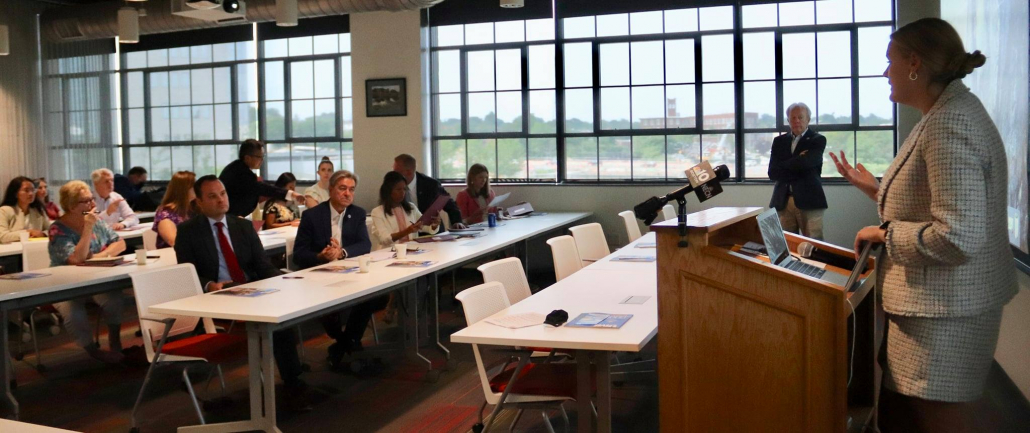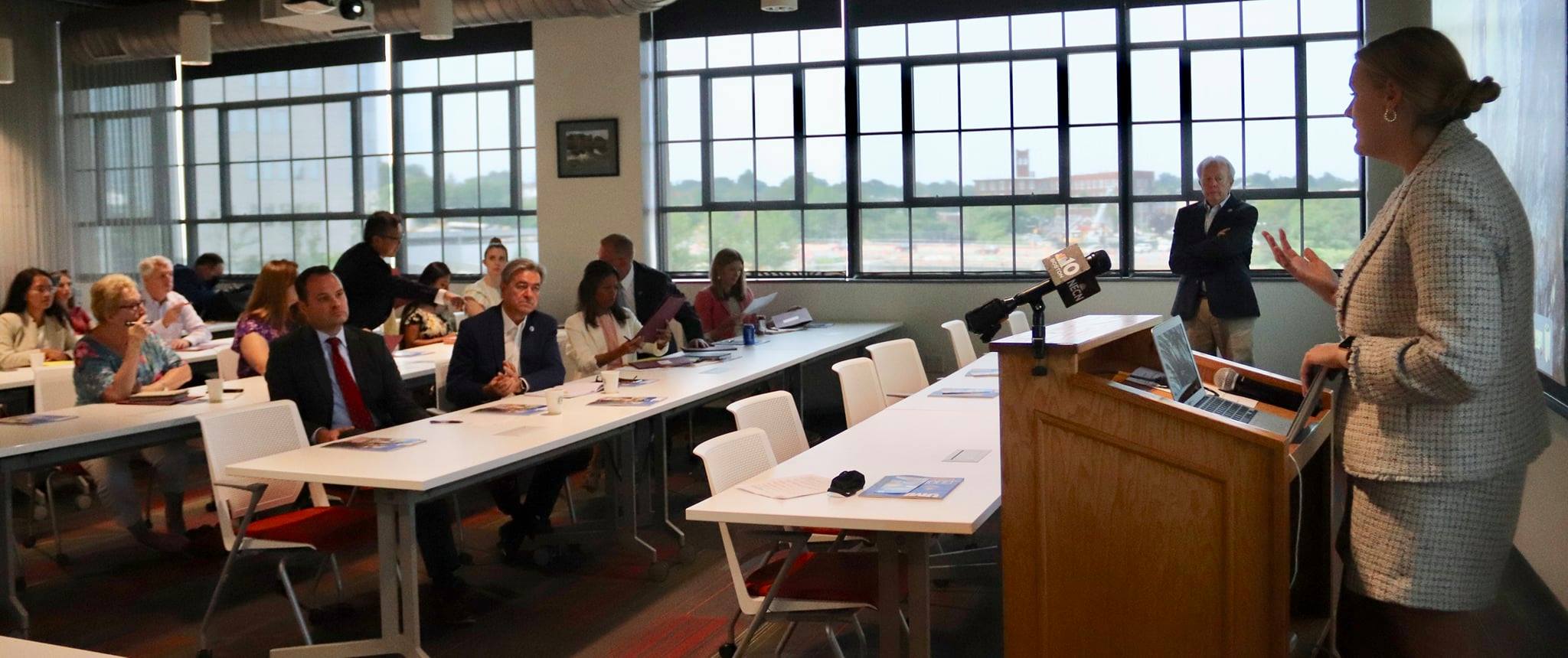
Gateway Cities Legislative Caucus Presentation
Lowell is first stop for pols on tour COVID-19 RECOVERY
7/19/2021 – By Prudence Brighton Correspondent
State legislators visiting LOWELL » Lowell Friday heard from local leaders about the challenges their agencies faced during the height of the COVID-19 pandemic and how the state can help with recovery. The Gateway Cities Legislative Caucus, which is chaired by Sen. Eric Lesser, a Democrat from Longmeadow, and Rep. Antonio Cabral, a Democrat from New Bedford, made Lowell the first stop in a three- city tour of communities along Interstate 495. In addition to Lowell, the group stopped in Methuen and Lawrence.
State Sen. Edward Kennedy of Lowell hosted his colleagues and agency leaders at the UMass Lowell Innovation Hub on Canal Street. Other area legislators were also present to hear about what is needed to recover from the pandemic.
A common thread through the comments of agency leaders was team members stepping up and doing herculean work to keep serving their populations. That includes Lowell’s diversity and the challenge that serving a city where more than 70 languages are spoken presents.
School Superintendent Joel Boyd gave a detailed presentation of the school departments’ response to what he called an “unprecedented year in public education.”
Despite the health crisis, the school department was “able to meet or exceed every goal and target we established at the beginning of the year.”
Boyd said, “Schools were in need of extra help even prior to the pandemic. The pandemic exposed a higher need.” He reminded the legislators that when schools closed in mid-March, they were expected to reopen in two weeks.
That time frame kept changing and it was just two months before the start of the school year that it Salaries paid to child care workers are not enough, according to Frederick. She talked about a housing crisis in the region in both rental or owned properties. In Lowell, rentals were taking 52% of income and in Lawrence 58%.
She called rental assistance “staggering.” The figure for Lowell is $ 8.4 million; for Lawrence, $ 6.4 million; and $ 1.8 million for Methuen, she said.
Lowell Community Health Center Executive Director Susan Levine also spoke about her team’s quick response when the lockdown hit in March 2020, “During the pandemic, our team stepped up under extraordinary circumstances. Within 48 hours of the lockdown we had a virtual appointment system up and running. We quickly focused on providing COVID testing — and we provided critical access to vaccines as soon as they became available.” The Community Health Center offers services to roughly 50,000 people each year and 41% of them are best served in a language other than English, according to Levine.
The Gateway Cities Legislative Caucus is traveling to all 26 municipalities. Friday’s trip was the second the legislators have made. The first was to Malden, Revere and Chelsea.
Midsized urban centers are considered “gateway cities,” mid- sized urban centers that anchor Lowell is first stop for pols on tour became apparent that significant changes would be necessary. The normal timeline for designing a new program in education is six months, according to Boyd. We had to design three new systems of public education in two months.” The school year was shortened by 10 instructional days. But right now there is “no way to fully measure the impact” of curtailing the school year. Some students reported doing better with remote learning, but more struggled with it.
“The impact of COVID19 has been found to be more significant for some students and more moderate for others with that impact ranging from academic challenges to social and emotional wellness,” he said.
“Addressing these impacts require school- based resources that can be tailored by school communities to meet the individual needs of each child,” Boyd told the legislators.
These needs include non- instructional needs of students. For example, some schools require “upgrades to create classroom environments that are more conducive to teaching and learning now and into the future.”
CTI Executive Director Karen Frederick told the legislators, “We were able to keep our programs going. We never lost one day of service.”
But there were new challenges.
Families couldn’t get to food,” Frederick said. So CTI carried it to people, providing “724 meals daily.”
Just as Boyd said the pandemic made systemic issues more visible, Frederick said, “child care was in crisis before the pandemic.” regional economies with social and economic challenges.

At the Gateway Cities event in Lowell Friday, Christine McCall, the city’s top economic development official, speaks to the panel as state Sen. Edward Kennedy, standing, listens.
COURTESY JENNIFER MYERS © 2021 lowell sun. Please review new arbitration language here. 7/19/2021 © 2021 Lowell Sun. Please review new arbitration language here. 7/19/2021 Powered by TECNAVIA
https://enewspaper.lowellsun.com?selDate=20210719&goTo=A01&artid=4 Monday, 07/19/2021









